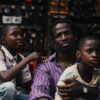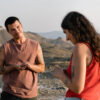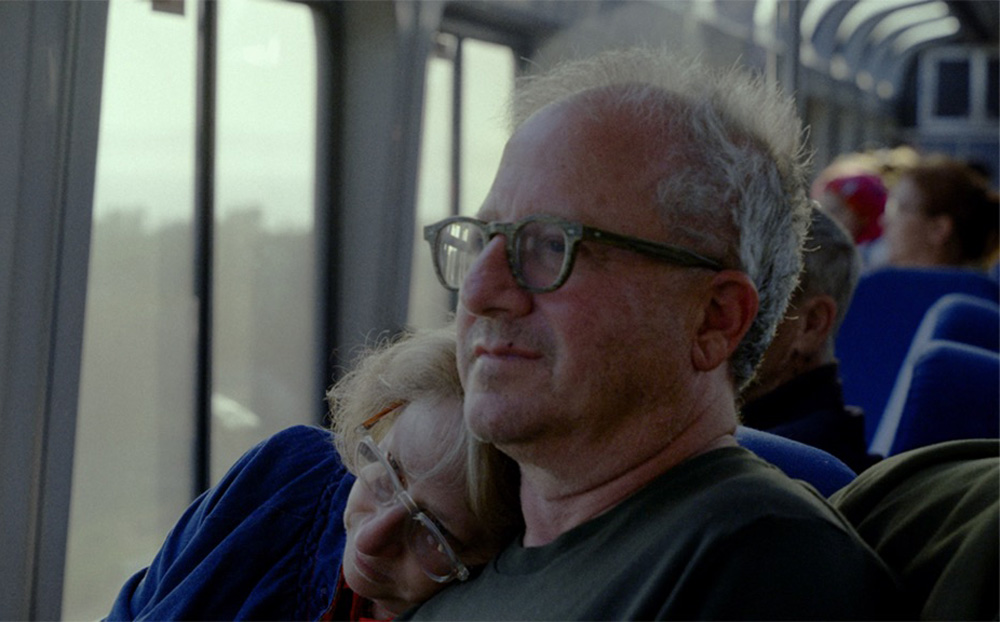Heidi Levitt has worked on some major movies, having been a critical component in the careers of Oliver Stone (“JFK”), Sally Potter (“Ginger and Rosa”) and Wayne Wang (“Smoke”) as the casting director who put together the sprawling ensembles in some of their most memorable films. Yet in her first time behind the camera for “Walk With Me,” she learned something that directors often say but may only be understood upon going through the process firsthand – the most personal movies are the ones that can reach the most people.
“I’m lucky that I was a casting director and I had all these great filmmakers on my shoulders. I kept thinking, “Well, how would they do this?” said Levitt, who trained the camera on her relationship with her husband Charlie Hess. “And oddly, I’ve worked with so many amazing directors on many, many art films. And this is probably a more commercial film because of the story being a story that belongs to so many people.”
It wouldn’t necessarily sound like it on paper when “Walk With Me” concerns the devastating diagnosis that Levitt and Hess received in February 2020 when it was revealed by a brain scan that Hess had early on-set Alzheimer’s. However, captured with both exceptional intimacy and tenderness, the film welcomes audiences to watch as the couple negotiates a difficult time with considerable grace, generously opening up about an experience that many have but few share so vividly as a gap grows in their perception of the world. As Levitt can’t give a second’s thought to anything other than finding the best course of action for Charlie, calling the film a coping device at one point when she could pour her energy into a project rather than waste it despairing about something for which there’s currently no cure, Hess can’t be entirely conscious of the way his mind is starting to betray him and before the disease forced him to retire, his career as a talented art director for magazines leads him to find ways to replenish his memory as much as he can with images and express himself as he has a greater tendency to get lost in the moment at hand.
If Levitt and Hess stare down a potentially lonely road as Hess starts various treatments to keep what memory he has intact, they have made it considerably less so for anyone who learns they share a similar situation as Levitt’s diligence illuminates a community that’s out there of doctors and others coping with the disease at the ready to lend support, and their own love story suggests what they’ve been able to withstand together since meeting in college and setting about their life after as a daily adventure. With “Walk With Me” recently taking the east coast by storm with premieres this month at the Hamptons and Woodstock Film Festivals, it is heading west this week to debut in Los Angeles at AFI Fest and Levitt graciously took the time to talk about how she came to turn the camera on herself, how the film became a way for both herself and her husband to remain engaged under dire circumstances, and why the time is ripe to make progress in Alzheimer’s research.
How did the idea come about to start filming this?
At the beginning, Charlie and I were going in for testing all the time and I realized that we were afraid to tell people [that he had Alzheimer’s], partly because it’s so uncomfortable. People don’t know what to say back to you when they think Alzheimer’s and I just realized like we can’t keep going around saying, “We’re having neurological testing.” It was almost because we didn’t want to admit to something that’s really happening, but I wanted to shed the stigma and I wanted to do something. I couldn’t find what the solution was [for the Alzheimer’s], so [filming] became a way for me to cope and to figure out a way through. I also thought it would be a way for Charlie to have purpose because he couldn’t get a job. When he left his job, he was complaining he had an asshole boss and it was at the beginning of this idea, “Is there something wrong with me?” And I was like, “I work in Hollywood. Move on.” But then when it was clear he couldn’t do his job, that’s what motivated me.
I’m really fortunate to know and have worked in the film industry for more than 30 years, so I have a lot of people that I do know to draw upon and Alex Gibney and I have a project together called “Exiles on Main Street” that I’ve been trying to make for a long time, but he was the one person I knew in the doc space, so he was the first person I went to. I knew as a personal documentary, it wasn’t his territory, but I also so respected him and he immediately responded to it, so I was like, “Okay, he thinks this is a good idea. I have to do this.” Then it was trying to get the family on board and that was complicated, but I had always been filming. If you see in the movie, there’s a lot of archival, so they were used to mom always being the person who is filming things. But this was different.
When you’re making a film, are there conversations you can have with your family that you might not otherwise?
I’m really transparent as a person in general and Charlie’s really honest, which is what works so well in the movie too, but some of the conversations that we had about how do we move through this probably wouldn’t have happened. Like any family, there were things that were not right all the time, but you gloss over them or move on and now we couldn’t because now the communication was really different and that forced us to deal with it when otherwise people often run away from problems.
Something I appreciated was how while you have experts, they’re not elevated visually above any other participant, so it really feels as if you’re entering a community that’s grappling with this disease. Was that something you were pretty conscious of or just because of the nature of the project happened?
There’s been a lot of formats [such as] the Oprah interview where you see the expert, and it’s almost like when you go into a doctor’s office and they’re in the white coat and it creates this distance between you and them and it’s like they’re the ones who have the answers. I really wanted this to be intimate and have conversations with people, so I did purposely stage things differently. COVID also did play a part of that because when I was starting, I couldn’t go easily into doctor’s offices in the same way and initially the interviews took me into some of the doctor’s homes. But the doctors became so engaged with this idea because they realize how much more needs to be done in terms of doing research and raising awareness and understood that we were coming at it from a different point of view. Coming from casting, I also have a narrative background and I really wanted to make this have a lyrical element to it [where] you would become engaged with us, not just me interviewing experts then cutting to the family. The experts have become part of my family in a way [since] we have become quite close to a lot of those doctors.
Because of the nature of Alzheimer’s, I liked how you allow Charlie to tell his own story at times while putting together these sequences where you can see his past, such as when he’s describing his career and his work throughout the years is displayed. What was it like to put those sequences together?
I have more of Charlie’s career in the movie than my own, and I felt that I wanted people to know who he was and he needed people to see what he made. I needed him to see that again and to be able to share that with my kids. Even my son discovers who his father was, right? So that sequence was hard to put together because obviously [Charlie] had a lot of work, but like any filmmaker, you’re trying to pick out what is the way to tell the story and how are you showing these images? Some of the illustrations that he did I fell were almost related to the brain or to the way he was seeing things, so I wanted to put that together.
Then he had been doing this project called the Art of Freelance, which was a group of independent artists in L.A. who would get together with a six-week or eight-week schedule and come up with a project and the project that he did was to take pictures on Pico Boulevard. This was just before [the diagnosis] when things were bubbling and we didn’t know what was really wrong. He loves to engage with people and he found the iPhone as this way of him being able to just walk around and take pictures and tell a story, so that’s what encouraged me to title this “Walk With Me” because he was walking in L.A., always wanting to walk and meet people. As a couple, we’re adventurers and we like to meet people, so that came together as a theme.
I’m also really in love with the map “Beauregard,”which is of his imaginary city [Charlie drew] and I knew about the map, and fortunately his parents kept a treasure trove of his artwork, so when I found that map, I [thought], “Oh my God, this is so ripe because it’s a map of the brain, a map of the world.” The metaphor of that was really important to me, so I filmed even more with the map and restored it. We animated little pieces and just decided to go micro onto it. Once he had been photographed holding the map and I found that photograph and realized I could use it again because it’s quite large. It’s like five feet.
When you’re so deep in this experience, as you’re living it and you come back to it and you have to organize it as a story for the film, is there anything that revealed itself about the situation?
Similar to the experience of living with this particular illness, I think the film is more than about illness. Like anything bad that happens to any family, we all face these situations where suddenly the bomb is dropped and you’ve got to readjust, but in terms of Alzheimer’s, it really makes you have to slow down a lot more because being present is so important. I think I allowed the film for the first few years to be a part of my discovery, like where I wanted to go, what I wanted to tell and I wasn’t sure I knew I wanted to document us. I love the movie by Sarah Polley, who made “Away From Her” about Alzheimer’s, but also “Stories We Tell,” her documentary, was somewhat a movie of discovery of her own parent and what I had to do was allow the narrative to build, [where] I wanted it to be an arc and I wanted us to be characters.
In terms of the way that I dealt with the disease, some of it did change from the movie in the sense that I was very interested first in pursuing all these different trials. Then as I learned more, I realized that these trials are all focused on one particular kind of drug and one theory, which is the amyloid theories and in the middle of 2021, I filmed something that didn’t get into the movie, but I’m very interested in talking more about which was a drug that was [considered] extremely controversial by the FDA and is off the market now called aducanumab.
I had been approached by a drug trial for another drug that’s also what they call a MAB drug, an infusion that you take, and it’s supposed to clear us of amyloid. When you think about amyloid, Dr. Rudy Tanzi [describes] it in the movie, thinking about it like cholesterol [where] if we’re going to start by people on statins early on, they don’t get heart attacks. I don’t believe that it’s that simple with Alzheimer’s, but I had been exploring that deeply and it did change the way that I thought because I had talked to theorists on both sides of the coin and it made me question whether or not to do this drug called Trailblazer, which has just been approved now. It might be a drug that will help some people, but had I not been so invested in studying this for the movie, I might’ve said, “Okay, let’s sign up for this,” and I think there’s so many risk factors involved for Charlie particularly.
What’s it like to have this, for yourself when it’s now a family history, but also starting to share it with audiences?
It’s so important. I come from the theater, and for me, a piece of work isn’t complete without an audience also being there, so that audience at that first screening was really amazing because they laughed and they cried and they felt it. And I want people to feel something. The movie opens with that quote about feeling something because that’s the most important thing – that is the way as storytellers that we can get change because people don’t understand the caretaker’s journey, what I’m going through. They don’t want to talk about Alzheimer’s because there’s this fear, “Oh, that person’s going senile,” and as a society, we don’t want to talk about it. We want to build memory care units and we want to say, “Oh, I’m so sorry,” but I want there to be a public discussion about how are we going into this next 20 years where so many more people keep getting this disease and it is growing exponentially.
We need to understand the way that we understand autism and neurodiversity now and we need to open the door a little bit more and talk about how are we going to live with this until we do find that drug. I don’t believe that there’ll be necessarily one magic pill, but there will be things we’re getting closer and closer to that will at least stop the progression and it is so important to raise awareness. I have this amazing group of doctors, some are not in the movie that I still talk to on a regular basis who want this desperately. We’re behind in Alzheimer’s research. We’ve known about the disease for over 100 years and we only started really seriously [studying] it in the ’80s. Imagine if we had started 40 years earlier. And it’s partly because we live in a society that is obsessed with youth and perfection, but we’re all going to die of something, so maybe there’s a way that one can find a better route to live through this alongside of finding a way to not get it.
Look, we all go to checkups all the time and they’ll check your eyes and your ears, but nobody checks your brain. How do we look at the brain? We can’t biopsy it. There’s new blood tests that people are talking about and other ways now to start getting to it earlier, but this one exam called the MOCA [Montreal Cognitive Assessment] that they use was developed so many, many years ago that for people who are from other cultures, it doesn’t work at all. They haven’t updated so much from the diagnosis onto the treatments and right now we’re in a moment where it’s like, why are we in this place when we shouldn’t have been here now? We should have been further along. I always think you get a bigger story by focusing in on the personal and being straight and we’re just one family, like 55 million others.
“Walk With Me” will screen at AFI Fest in Los Angeles on October 27th at 6 pm at Chinese 6.




